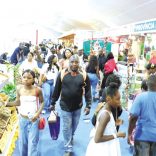LAM Mozambique Airlines readmitted to IATA Clearing House
Nyusi opens private sector conference – AIM report

Photos: Facebook / Presidente Filipe Nyusi
Mozambican President Filipe Nyusi on Thursday urged Mozambican private businesses to use the country’s natural and human resources in order to reduce the import of foodstuffs and of raw materials to supply the national food industry.
Agriculture is the country’s main economic activity. It accounts for 23 percent of gross domestic product and employs more than two thirds of the economically active population. Mozambique has 36 million hectares or arable land, but only 10 percent of these are in use, which leaves the country with an enormous potential for the development of agriculture.
The current state of the economy is characterised by low levels of production and productivity which are reflected in the balance of trade, where imports outstrip exports, putting pressure on the country’s foreign exchange reserves.
Speaking at the opening of the 16th annual private sector conference (CASP), Nyusi said the current level of food imports is inconceivable given that Mozambique has excellent agro-ecological conditions for developing sustainable agriculture.
“The best antidote is to increase levels of production,” he said. “and it is the private sector that can make a great contribution to increased production and productivity. We have land and we have water sources. We have hard working people and committed human capital.”
Yet the country imports rice, meat, chickens, eggs, tomatoes, onions, potatoes and much else which could be produced on Mozambique’s own arable land in areas such as Chokwe, Mopeia, Tsangano, Unango, Malema, Sussundenga and many others.
Nyusi therefore challenged Mozambican business to change its way of thinking and turn its attentions to increasing production and productivity and to the constraints in the value chain, particularly those concerned with marketing and agro-processing.

The CASP is a 2 day event organised by the confederation of Mozambican Business Associations (CTA) in partnership with the government. This year it is being held under the motto, “improving the business environment, in order to speed up economic recovery, with agribusiness as the accelerating factor”.
The private sector recognises agriculture as a national priority but wants to see the government grant additional incentives and preferential treatment, just as many other countries treat their farmer preferentially. In particular businesses in this area are calling for a reduction in the corporation tax for agriculture from a maximum of 32 percent to just 10 percent, arguing that this will make the sector more attractive to investors.












Leave a Reply
Be the First to Comment!
You must be logged in to post a comment.
You must be logged in to post a comment.